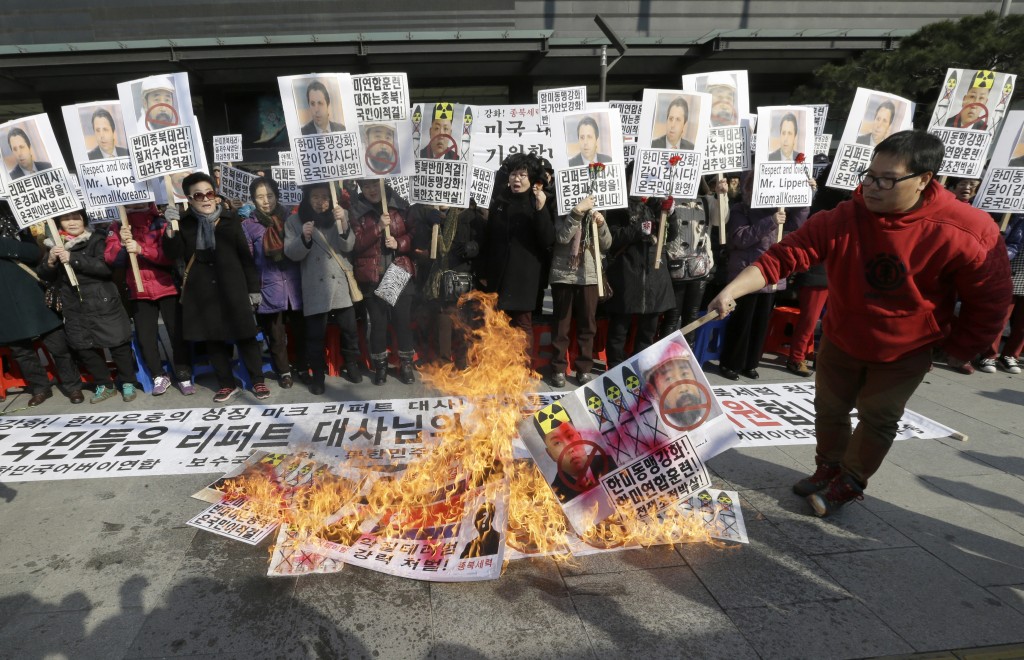- California Assembly OKs highest minimum wage in nation
- S. Korea unveils first graphic cigarette warnings
- US joins with South Korea, Japan in bid to deter North Korea
- LPGA golfer Chun In-gee finally back in action
- S. Korea won’t be top seed in final World Cup qualification round
- US men’s soccer misses 2nd straight Olympics
- US back on track in qualifying with 4-0 win over Guatemala
- High-intensity workout injuries spawn cottage industry
- CDC expands range of Zika mosquitoes into parts of Northeast
- Who knew? ‘The Walking Dead’ is helping families connect
S. Korea denounces N. Korea over its reaction to Lippert case

A South Korean conservative activist burns a North Korean flag, portraits of North Korea leader Kim Jon Un and Kim Ki-jong, the suspect of slashing U.S. Ambassador to South Korea Mark Lippert, during a rally demanding speedy recovery of Lippert near the U.S. embassy in Seoul, South Korea, Friday, March 6, 2015. A knife attack Thursday that injured Lippert is the latest act of political violence in a deeply divided country where some protesters portray their causes as matters of life and death. The letters at a banner read ” A rally demanding speedy recovery of U.S. Ambassador to South Korea Mark Lippert ” (AP Photo/Ahn Young-joon)
SEOUL, March 6 (Yonhap) — South Korea denounced North Korea on Friday for approving of the shocking knife attack on Mark Lippert, the U.S. ambassador to Seoul.
Pyongyang’s support for the heinous act demonstrates the insincerity of the communist nation’s claim that it is against terrorism, the unification ministry said in a statement.
Hours after Lippert was slashed on his face and arm with a 25-centimeter knife wielded by a South Korean activist during a breakfast forum in Seoul Thursday, the North said that he deserved “such an attack.”
The attack “reflects the mindset of South Korean people” amid growing anti-American sentiment in the South, the North added through its official news agency KCNA.
“(The government) strongly criticizes North Korea for distorting the true nature of this incident and supporting it,” ministry spokesman Lim Byeong-cheol said, reading out the statement at a press briefing.
The North should stop “irrational propaganda” activities and think about what it has to do for the development of inter-Korean ties and peace on the peninsula, Lim said.
The South’s law-enforcement authorities are investigating the case, after the suspect, Kim Ki-jong, was arrested at the scene.
Leading a progressive civic group, the 55-year-old suspect is known to have engaged in anti-war and pro-reunification campaigns for a long time. He traveled to North Korea seven times — six to Kaesong between 2006 and 2007 and one to Mount Kumgang in 1999 — according to the unification ministry.
Police said they are looking into whether Kim was involved in any act violating the anti-communist National Security Law.
The unification ministry spokesman said the government had approved his trips to the North in accordance with related rules.
“I don’t think we have any specific ways, other than his testimonies, to confirm what he exactly did during his visits to North Korea,” Lim said.
He would not speculate on the future of inter-Korean relations amid concerns that the incident will have a negative impact on the already frosty bilateral ties, let alone the Washington-Pyongyang standoff.
The attacker is a member of the Korean Council for Reconciliation and Cooperation (KCRC), the organizer of the forum during which the incident happened.
KCRC, a coalition of nearly 200 political, civic and religious organizations working to promote peace on the peninsula, has long endeavored to promote civilian exchanges between the two Koreas.
The council has come under public criticism for failing to prevent Kim’s entry into the conference. He was not formally invited.
The head of the KCRC, Hong Sa-duk, immediately resigned from his post and there are worries that the council’s activity may be affected.
The South is seeking to arrange a number of joint events with the North this year, the 70th anniversary of Korea’s liberation from Japan’s 35-year colonial rule.
The unification ministry said it hopes that the council will continue to make appropriate contributions to South-North cooperation and exchanges.
Experts said the incident may deepen rifts between conservative and progressive people in the ideologically-divided nation.
“There is a possibility that internal conflict will intensify over the angle to look at this case. It’s needed to take a prudent approach until the results of the investigation come out,” said Kim Yong-hyun, a professor of North Korea studies at Seoul’s Dongguk University.















